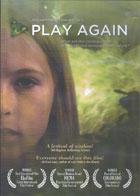
Play Again 2010
Distributed by Bullfrog Films, PO Box 149, Oley, PA 19547; 800-543-FROG (3764)
Produced by Meg Merrill
Directed by Tonje Hessen Schei
DVD, color, 80 min.
Jr. High - Adult
Environmental Studies, Media Studies
Date Entered: 03/10/2011
Reviewed by Tom Ipri, University of Nevada Las VegasPlay Again is an exceptional film which asks the question “What is it that children are missing when they spend so much time looking at screens?” The film follows two paths. The main path revolves around six teenagers, aged 13-15, who self report to spending somewhere between 5 and 15 hours per day looking at screens. These teenagers enroll in a camp during which they have no access to media and spend their time engaged with nature instead. The second path weaves interesting observations from media experts into the main story of the teenagers. The combined weight of the two approaches makes for fascinating viewing.
One of the strengths of the film is that it is not totally damning in its approach to the effects of media consumption. Play Again allows the teenagers—all of whom are interesting and engaging—speak to the reasons why they feel so connected to media, not all of which are negative. Some point to the creative and intelligent strategies needed to master video games and others speak to the personal connections they feel toward others when they reach out through social media. Even the media experts admit that the influence of media is not damaging in and of itself but is only problematic when it becomes the main framework through which kids understand the world and when it sets unrealistic expectations for interacting with others. In addition, the teenagers report a wide-range of responses to the camp. All these factors point to the complexity of the issues raised.
The film definitely posits that exposure to nature is a positive experience for children of all ages and points to research that shows how an over-exposure to media can have negative effects. Many of the experts use dire language to describe the path society is on, some going as far as to predict “the death of childhood.” However, the overall message of the film pleads more for moderation than privation. The film argues that children need to be exposed to nature for full, well-rounded cognitive development and that society can’t expect future generations to care about the environment if they never have experiences in it. If media exposure is part of larger, more diverse life experiences, then the negative effects may be mitigated.
Play Again is unique in that it makes a strong connection between excessive media viewing and environmental degradation in that media viewing increases consumption and consumption has damaging effects on the environment. The film is consistently compelling in both the story of the teenagers and the interviews with media experts.
Awards
- Best Educational Film, EkoFilm, Czech International Environmental Film Festival
- Best of Fest, Colorado Environmental Film Festival
- Special Mention, FICMA, Barcelona Environmental Film Festival